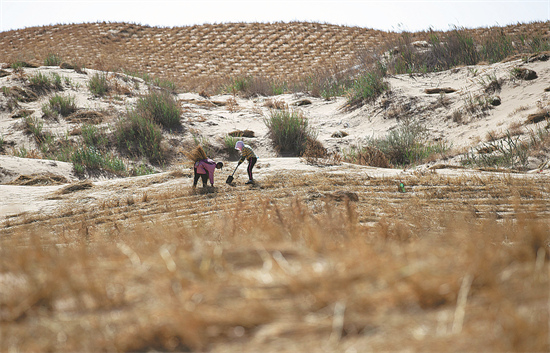On a sand dune not far from a national desert park in Lingwu city, northwest China’s Ningxia Hui Autonomous Region, people are busy planting hay. The sown hay is shaped into a checkerboard field pattern, which makes it look like a Chinese chessboard, and the sand is thus fixed, allowing fresh vegetation to sprout.
These workers are dubbed the “modern-day Yugong” for their daily efforts to control the sand and turn the desert into an oasis, accomplishing a seemingly impossible task through dogged persistence. Yugong, or “the old madman of the mountain”, is a legendary character from ancient China who is said to have cleared a mountain in front of his house with his bare hands, followed by his descendants.
Desertification control workers make straw checkerboard barriers near the Maowusu desert border in Lingwu, northwest China’s Ningxia Hui Autonomous Region, in June. (Photo/Xinhua)
Wang Youde, 69, led efforts to transform a significant portion of the Maowusu Desert to make Lingwu Baijitan National Ecological Reserve an oasis. “For many years, the Maowusu Desert has endangered agricultural land. In the past, leaving home meant entering the desert. You had to brave strong winds to get to work,” said Wang, whose work has been praised across the country.
He added that it was difficult for local people to maintain even an orchard due to harsh weather and environmental conditions, with constant winds and sandstorms severely affecting fruit growth. “After the success of our sand control campaign, we were able to protect our homeland as the sand receded more than 20 kilometers east of our mother river, the Yellow River,” Wang noted.
This 42,000-hectare oasis created by Wang Youde and his colleagues has become an important protective barrier for the ecological system in northwest China, thanks to three generations of dedicated sand control efforts. At the same time, when the desert was turned into farmland, forest farm workers also benefited, with many now earning 120,000 yuan ($17,904) a year.
–


